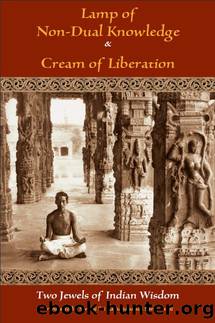Lamp of Non-Dual Knowledge & Cream of Liberation by Sri Karapatra Swami

Author:Sri Karapatra Swami [Saraswathi, Ramanananda]
Language: eng
Format: epub
ISBN: 9-780941-532389
Publisher: World Wisdom
Chapter VII
Sâksâtkâra
Realization
1. In the foregoing chapters, it was said that direct knowledge must first be gained and then the latent tendencies of the mind wiped out so that Brahman may be realized. Now realization is dealt with.
The Master says: âWise son, now that you have gained direct knowledge by enquiry into the Self, you should proceed with meditation.â
2. D.: Master, now that I have gained direct knowledge by enquiry and my task is finished why should I meditate further and to what end?
3-4. M.: Though by reflection, direct knowledge of the Self has been gained, Brahman cannot be realized without meditation. In order to experience, âI am Brahman,â you must practice meditation.
5-6. D.: You ask me to pursue meditation for realizing Brahman? I have already gained direct knowledge by enquiry into the sacred text. Why should I now practice meditation?
M.: If you mean to say that enquiry into the sacred text results in realizing Brahman, who can deny it? No one. Truly this enquiry must end in the realization of Brahman.
Let us now enquire into the meaning of the text. Whose identity with whom is implied in it? It must be the identity of the consciousness witnessing the five sheaths of the individual, the implied meaning of âthouâ, with Brahman, the implied meaning of âThatâ; it cannot be of the jîva, i.e., the personal soul with Brahman. By enquiry the identity of the witnessing consciousness with Brahman has certainly been found. Of what use can this identity of the witness with Brahman be to you?
7. D.: On enquiry into the meaning of the sacred text, when one has realized that the witness is Brahman and vice versa, how can you raise the question, âOf what use can it be to the person?â Its use is evident. Formerly the seeker was ignorant of the identity and now by enquiry he is aware of it.
M.: By enquiry you have certainly known that the witness is Brahman and that the unbroken, all-perfect Brahman is the witness. Still this knowledge is not the end and cannot serve your purpose. Suppose a poor beggar, who was ignorant of the fact that a king resident in a fort was the emperor of the world, later knew it. How does this newly acquired knowledge improve his position? It cannot serve any useful purpose for him.
8. D.: Before enquiry, ignorance prevails. After enquiry, knowledge is gained that the witness is Brahman. Now knowledge has taken the place of ignorance. This is the use.
M.: How does this affect the fact? Whether you have known it or not, the witness ever remains Brahman. Your knowledge of the fact has not made Brahman of the witness. Whether the poor beggar knew it or not, the king in the fort was the emperor. His knowledge did not make an emperor of the king in the fort. Now that you have known the witness to be Brahman, what has happened to you? Tell me. There can be no change in you.
9. D.: Why not? There is a difference.
Download
This site does not store any files on its server. We only index and link to content provided by other sites. Please contact the content providers to delete copyright contents if any and email us, we'll remove relevant links or contents immediately.
| 19th Century | 20th Century |
| Exploration | First Nations |
| Founding | Pre-Confederation |
| Province & Local | War of 1812 |
Cat's cradle by Kurt Vonnegut(15335)
Pimp by Iceberg Slim(14488)
4 3 2 1: A Novel by Paul Auster(12375)
Underground: A Human History of the Worlds Beneath Our Feet by Will Hunt(12090)
The Radium Girls by Kate Moore(12018)
Wiseguy by Nicholas Pileggi(5770)
The Fire Next Time by James Baldwin(5431)
Perfect Rhythm by Jae(5398)
American History Stories, Volume III (Yesterday's Classics) by Pratt Mara L(5300)
Paper Towns by Green John(5179)
Pale Blue Dot by Carl Sagan(4996)
A Higher Loyalty: Truth, Lies, and Leadership by James Comey(4954)
The Mayflower and the Pilgrims' New World by Nathaniel Philbrick(4494)
The Doomsday Machine by Daniel Ellsberg(4484)
Killers of the Flower Moon: The Osage Murders and the Birth of the FBI by David Grann(4435)
The Sympathizer by Viet Thanh Nguyen(4384)
Too Much and Not the Mood by Durga Chew-Bose(4338)
The Borden Murders by Sarah Miller(4313)
Sticky Fingers by Joe Hagan(4188)
